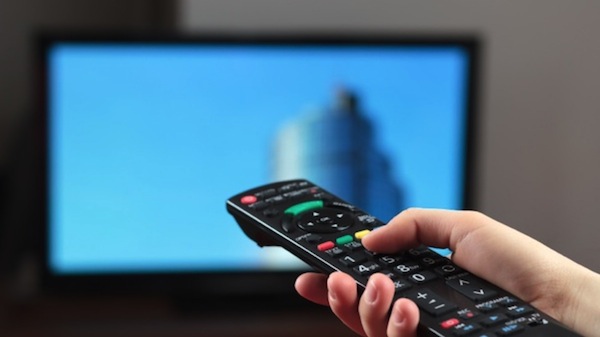Stay Informed
Popular Articles
- Hiatal Hernia: Hidden Cause of Chronic Illness
- Small Intestinal Bacterial Overgrowth (SIBO)
- Applied Lymphology: Unlocking the Secret to Pain Relief
- An Introduction to Constitutional Iridology
- The Low Down on Liver Detoxification
- An Energetic and Emotional Approach to Cancer
- Fat Facts
- Marrow in the Bones
- Blood Type and Nutrition
- Cardiac Herbs: Beyond Hawthorn
Quick Search
The School of Modern Herbal Medicine




Are You Suffering From Sleep Debt?
- 5/28/2015
- Categorized in: Specific Health Problems
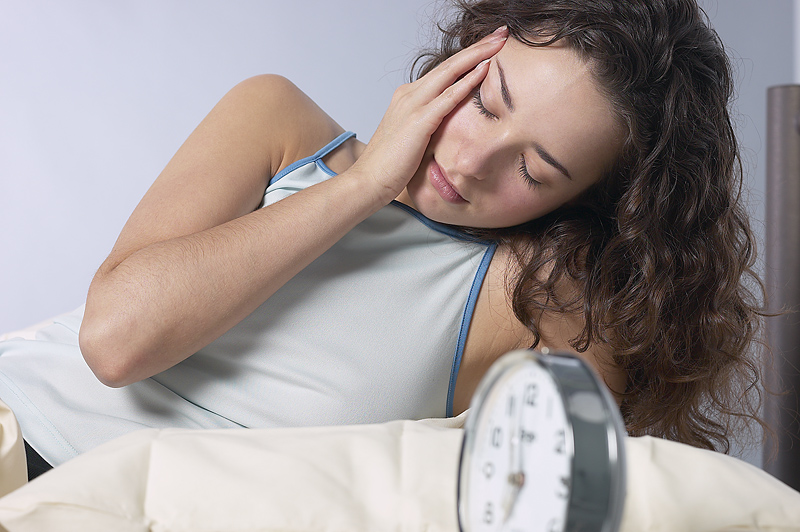 Most of us recognize the perils of financial debt, but did you know that you can build up debt when it comes to sleep? Getting short-changed occasionally on our sleep isn’t a serious problem, but when it happens night after night, we build up a back-log of needed sleep. This sleep "debt" adversely affects our mood, health and safety.
Most of us recognize the perils of financial debt, but did you know that you can build up debt when it comes to sleep? Getting short-changed occasionally on our sleep isn’t a serious problem, but when it happens night after night, we build up a back-log of needed sleep. This sleep "debt" adversely affects our mood, health and safety.
The average person needs about eight and one-half hours of sleep every night. You might need a little less or a little more, but you need this sleep every day, just like you need water and oxygen every day. Losing just one hour of sleep per day (seven hours instead of eight, for instance) builds up a sleep debt of one hour per day.
It’s not just the quantity of sleep you need; it’s also the quality of that sleep. You need several hours of REM (rapid eye movement) sleep every night to be healthy. This is the sleep in which you dream. When catching up on sleep-debt, your body will often “compress” sleep patterns to catch up on this much-needed REM sleep.
You also need a certain amount of deep sleep. During the deepest stages of sleep your body releases growth hormone to stimulate tissue repair and regeneration. This means that if you don’t get enough good quality sleep it will adversely affect your physical health. For instance, sleep debt makes you more likely to catch a cold or the flu. In fact, sleep deprivation can actually cause flu-like symptoms without an infection. Sleep debt even makes you more prone to heart disease and stroke.
Lack of sleep also affects your mood and your performance. It makes it harder for you to concentrate, which means you’re not as productive at work. Sleep debt can make you irritable or depressed and otherwise affect your mood. You even age more quickly when you don’t get enough sleep.
 Another major problem with sleep debt is that it causes people to be more accident-prone. About 100,000 automobile accidents occur every year, resulting in 1500 deaths and about $12.5 billion dollars in damage. Numerous industrial accidents are also caused by a lack of sleep. The famous Exxon Valdez oil spill near Alaska’s shoreline was not caused by alcohol use as most people think. During the trial, investigators learned that the captain of the ship was sleep deprived and drowsy. It cost $2 billion dollars to clean up that spill and Exxon was fined $5 billion.
Another major problem with sleep debt is that it causes people to be more accident-prone. About 100,000 automobile accidents occur every year, resulting in 1500 deaths and about $12.5 billion dollars in damage. Numerous industrial accidents are also caused by a lack of sleep. The famous Exxon Valdez oil spill near Alaska’s shoreline was not caused by alcohol use as most people think. During the trial, investigators learned that the captain of the ship was sleep deprived and drowsy. It cost $2 billion dollars to clean up that spill and Exxon was fined $5 billion.
Millions of Americans Aren’t Getting Enough Sleep
The bad news is that one-half of all Americans suffer from some degree of insomnia and about one-third suffer from life-disrupting insomnia. This means that a large percentage of the population is suffering from poor quality sleep and/or sleep debt.
There are many factors that contribute to sleep problems. These include stress and anxiety, dehydration, a sedentary lifestyle, poor nutrition, the over use of stimulants like caffeine, and artificial lighting. If you’re having trouble falling asleep, staying asleep or sleeping soundly, it’s important to examine your lifestyle and determine what you can do to get the sleep you need.
A Dozen Tips for a Better Night’s Sleep
The tips offered below can help you get a good night's sleep. Think about which of these tips might be of benefit to you, and then make appropriate changes to "get out of debt" on your sleep. The causes of insomnia vary from person to person, so it may be helpful to choose one or two at a time to see if they make a positive difference in your sleep patterns.
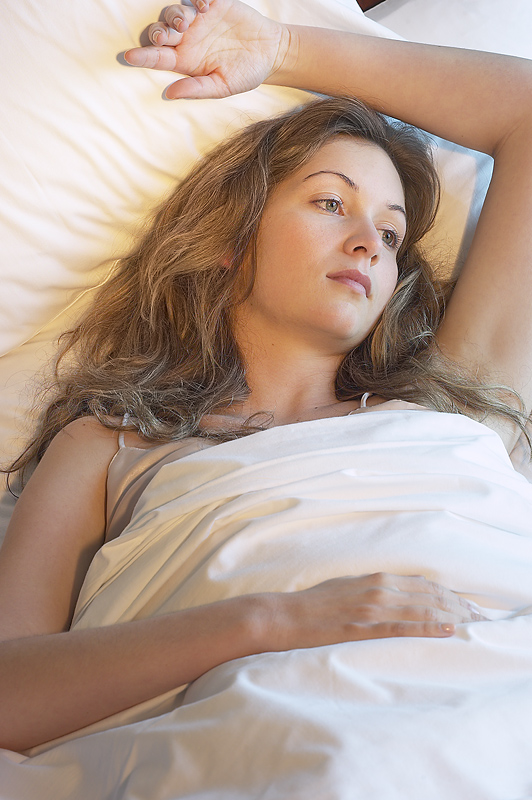 Sleep Tip #1: Schedule Sleep
Sleep Tip #1: Schedule Sleep
Your body has an internal “clock” that helps actuate periods of sleep and wakefulness. If you can get on a schedule that allows you to get to bed at roughly the same time each night and wake up the same time each morning, it will ease both falling asleep and waking up. When your sleep schedule is thrown off (such as during international travel), you can help "reset" or adjust your biological clock by taking Melatonin at bedtime.
Sleep Tip #2: Get to Bed Early
In Chinese medicine it is believed that certain meridians (energy flows) are active at certain times of the day. According to this theory, the gall bladder and liver meridians are active from around 11 PM to 1 AM and 1 AM to 3 AM respectively. This is the peak time for your body to detoxify if you are asleep by 11 PM. If you are not asleep when the gallbladder meridian becomes active, you may get a surge of nervous energy that inhibits sleep. This will be followed by feeling sluggish and tired the next morning.
Generally speaking, if you can be in bed by about 10:30 you’ll sleep more soundly and wake more refreshed. If you regularly stay up late and then have a hard time getting out of bed in the morning, consider taking a Liver Tonic Formula to support the health of your liver.
Sleep Tip #3: Avoid Late Night Stimulation
In the evening, avoid activities that activate your mind or get your adrenaline pumping. This includes watching exciting TV shows or movies, listening to loud stimulating music or even reading thrilling novels. It’s also not a good idea to exercise within a few hours of bedtime. Instead, pick evening activities that help you wind down, such as listening to relaxing music, reading uplifting books, or sharing a massage with your partner.
Sleep Tip #4: Create a Relaxing Atmosphere
Make your bedroom a place that is conducive to rest, not work or recreation. Remove TVs, computers, cell phones and other distractions from your sleep area and keep your bedroom uncluttered. Most importantly, don’t work or keep work materials in your sleep area. Also, keep electrical equipment at least three feet away from your bed to minimize electromagnetic influences while you sleep.
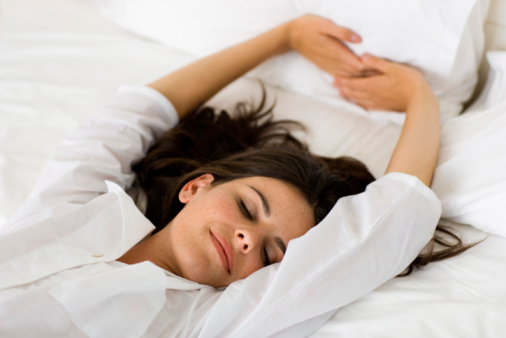 If you have a hard time relaxing at night, try taking some nervine herbs or an herbal Sleep Formula about one hour before going to bed. Examples are NSP's Herbal Sleep, HerbPharm's Relaxing Sleep, Christopher's Slumber and Plantaery Herbal's Valerian Easy Sleep. Look for formulas containing hops, valerian, scullcap, kava kava and passion flower. Follow directions on the label.
If you have a hard time relaxing at night, try taking some nervine herbs or an herbal Sleep Formula about one hour before going to bed. Examples are NSP's Herbal Sleep, HerbPharm's Relaxing Sleep, Christopher's Slumber and Plantaery Herbal's Valerian Easy Sleep. Look for formulas containing hops, valerian, scullcap, kava kava and passion flower. Follow directions on the label.
If you have a lot of muscle tension, straight Kava Kava can help your muscles relax so you can sleep better. Take one to two capsules about one hour before bedtime, either by itself or with the Sleep Formula suggested above.
For people who tend to drink in the evening, kava kava is an excellent alternative to alcohol. It has a similar relaxing effect to alcohol, but doesn’t act as a diuretic, which can make you wake up at night needing to urinate. It also doesn’t destroy brain cells or numb your thought processes.
Sleep Tip #5: Don’t Eat Late
It's hard for your body to fall asleep when it is digesting a heavy meal, so try to eat dinner at least two hours—and preferrably four hours—before bedtime. Don’t eat sugary snacks before sleeping, as this creates blood sugar problems that can wake you up at night. Also, avoid all stimulants, including spicy foods in the evening. They interfere with quality of sleep. If you suffer from hypoglycemia, it's okay to eat a small snack of nut butter, cheese or some other high protein food before bed (See Tip #9).
Sleep Tip #6: Darken Your Sleep Area
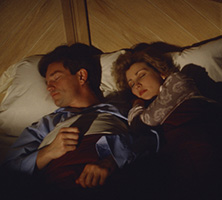 The natural way to fall asleep is for your body to convert a neurotransmitter called serotonin into melatonin. Melatonin puts you to sleep. Your pineal gland starts converting melatonin to serotonin when it gets dark. If you try to unwind at night in a well-lit room, this process will be inhibited and you will likely keep yourself awake.
The natural way to fall asleep is for your body to convert a neurotransmitter called serotonin into melatonin. Melatonin puts you to sleep. Your pineal gland starts converting melatonin to serotonin when it gets dark. If you try to unwind at night in a well-lit room, this process will be inhibited and you will likely keep yourself awake.
Unfortunately, with the advent of electric lights, we extend our “day” into the evening hours. This prevents us from falling asleep naturally. Watching TV, staring at a computer screen and artificial light all inhibit sleep. So, make your bedroom as dark as possible and as the time for sleep approaches turn off the TV or computer and retire to a darkened room. You may even want to try wearing a sleep mask.
If darkening the room doesn’t work, try taking a 5-HTP supplement about one hour before bedtime. 5-HTP is a precursor to serotonin, which will increase production of melatonin when you turn out the lights and make your bedroom as dark as possible.
Sleep Tip #7: Breathe Deeply
Oxygen is very important to sound sleep. Many people find that cracking a window open to let in a little fresh air results in a better night’s sleep. Of course, this isn’t going to work if you live in an area with heavy air pollution. In that case, you may need some kind of air filtration or purification system.
If you snore at night, it’s a sign that you have constricted airways inhibiting the amount of oxygen you are getting as you sleep. So, not only does snoring contribute to insomnia in the person who sleeps with you, it also interferes with the quality of your own sleep.
If you snore quite loudly, you may have a problem with sleep apnea. Sleep apnea occurs when the throat closes down and makes it impossible to breathe while sleeping. This starves your tissues of oxygen, which can cause you to wake up after a minute or so of not breathing, shift positions, and go back to sleep. The problem is that you are not aware that you are waking up numerous times each night starved for oxygen.
Sleep apnea doesn’t just interfere with your sleep; it is dangerous. It not only puts you at risk of dying in your sleep, it stresses your heart and increases your risk of heart disease. If you snore loudly, get checked for sleep apnea. If you have this condition, medical help may be necessary to correct the problem and ensure that you get enough oxygen during sleep. To protect your heart, trying taking 50 mg of Co-Q 10 and four hawthorn capsules at bedtime.
Factors that contribute to snoring and sleep apnea include excess weight, swollen lymph nodes, sinus congestion, and inflammation of the mucus membranes. A Decongestant Formula may help shrink swelling of inflamed mucus membranes, reduce sinus congestion and swollen lymph nodes and otherwise help to open respiratory passages. Food and respiratory allergies may be a factor, so screen yourself for allergy-causing foods. High doses (2,000-3,000 mg) of vitamin C with citrus bioflavonoids can help counteract histamine reactions if allergies are a factor. Weight loss and colon cleansing are also helpful.
Sleep Tip #8: Quiet Your Mind
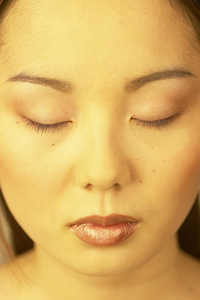 If you’re one of those people who lie awake at night unable to get your mind to "shut up" so you can go to sleep, here are some suggestions for quieting your mind and getting a better night’s sleep. First, before going to bed, get a notepad and write down your to-do list for the next day. This helps you “get it off your mind” so you can relax. It may also help to keep a journal, as this allows you to let go of thoughts and feelings by expressing them on paper.
If you’re one of those people who lie awake at night unable to get your mind to "shut up" so you can go to sleep, here are some suggestions for quieting your mind and getting a better night’s sleep. First, before going to bed, get a notepad and write down your to-do list for the next day. This helps you “get it off your mind” so you can relax. It may also help to keep a journal, as this allows you to let go of thoughts and feelings by expressing them on paper.
A second technique for quieting your mind is to breathe deeply as you lie in bed and focus on relaxing your body. Starting with your toes and working your way up to your head, tense your muscles and then let them relax. Imagine them sinking into the bed. Focus your mind on your breathing or mentally reciting a positive statement such as “I am relaxed” or “All is well.”
If you’re still having trouble getting your mind to quiet down, a Sleep Formula containing GABA and passion flower may be helpful. I've had very good results with the Sound Sleep formula from Gaia Herbs. Other options include NSP's GABA Plus, Power to Sleep from Irwin Naturals and GABA Ease from Vitanica. Take this supplement about one hour before bedtime. If you are easily distracted by small things (such as a dripping faucet or other small noises) try taking two 100 mg capsules of magnesium one hour before bedtime. Empty the contents under your tongue and let the magnesium sit in your mouth for ten to fifteen seconds before washing it down with a drink of water.
Sleep Tip #9: Reduce Your Stress Level
 Since stress is a major factor in sleep problems, reducing your stress level during the day can help you sleep better at night. If you are tired during the day but don't sleep well, you may be suffering from adrenal exhaustion.
Since stress is a major factor in sleep problems, reducing your stress level during the day can help you sleep better at night. If you are tired during the day but don't sleep well, you may be suffering from adrenal exhaustion.
Symptoms of adrenal exhaustion include fatigue, mental confusion and emotional sensitivity during the day, followed by restless sleep with disturbing dreams. You may also need to wake up frequently to urinate. One of the best remedies for this is an Adaptogen Formula. The one I've had the most experience with is Nervous Fatigue Formula from NSP. Within three to four nights, this formula can usually help you sleep more soundly. You could also try SleepThru from Gaia Herbs or Power to Sleep from Irwin Naturals.
For more serious adrenal exhaustion, such as post-traumatic stress disorder, an Adrenal Tonic Formula, such as NSP's Adrenal Support, may be helpful. A typical dose is one capsule two to three times daily, including one at bedtime.
In addition, it is very important for people suffering from too much stress to avoid sugar and caffeine, as these make the problem worse. You may need to reduce your workload, or at least make more time for rest and relaxation.
A good therapy for people who are under a lot of stress is an Epsom salt bath. In the evening draw a warm bath and add two cups of Epsom salt and 10-20 drops of your favorite relaxing essential oils. Lavender, bergamot, rose, ylang ylang and patchouli are good options. Light a few candles, put on some relaxing music and turn out the lights, then soak in the warm bath for 15-20 minutes. This can really reduce nervous stress and prepare you for a better night’s sleep.
Sleep Tip #10: Balance Your Blood Sugar
If you wake up in the middle of the night thinking about your problems and can't get back to sleep, this may be a sign of 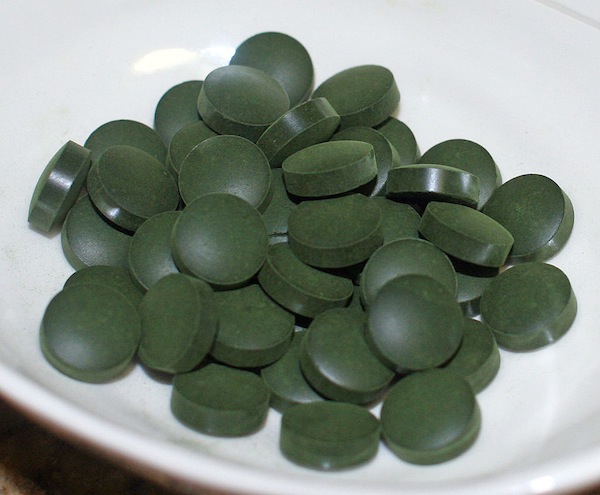 blood sugar problems. What is happening is that your blood sugar is dropping too low during sleep and your adrenal glands are firing off stress hormones (adrenaline and cortisol) to elevate your blood sugar. Avoiding sugar, white flour products, alcohol and caffeine will help. Take two licorice root and two NSP Super Algae capsules with breakfast and lunch to stabilize your blood sugar. Also, eat a small protein-rich snack at bedtime. This might consist of a couple tablespoons of almond butter, peanut butter or cottage cheese, or a few raw walnuts.
blood sugar problems. What is happening is that your blood sugar is dropping too low during sleep and your adrenal glands are firing off stress hormones (adrenaline and cortisol) to elevate your blood sugar. Avoiding sugar, white flour products, alcohol and caffeine will help. Take two licorice root and two NSP Super Algae capsules with breakfast and lunch to stabilize your blood sugar. Also, eat a small protein-rich snack at bedtime. This might consist of a couple tablespoons of almond butter, peanut butter or cottage cheese, or a few raw walnuts.
By the way, bed-wetting in children can often be a sign of blood sugar problems or dehydration. If you have a child with bed-wetting problems, try keeping them away from refined carbohydrates and giving them licorice root to stabilize their blood sugar levels. Magnesium and cornsilk may also be helpful for bed-wetting.
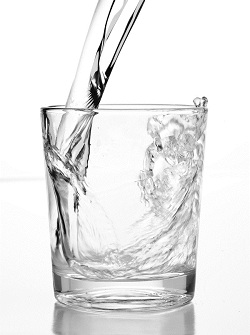 Sleep Tip #11: Stay Hydrated
Sleep Tip #11: Stay Hydrated
Not drinking enough water can make you feel anxious and tense. Being properly hydrated calms the brain and promotes better sleep. Try drinking at least 1/2 ounce of pure water per pound of body weight per day. In other words, two quarts (64 ounces) is the right amount of water for a 128 pound person.
If you wake up needing to urinate, drink more water during the day but very little water in the evening. You may also need to take something to strengthen your kidneys, such as a Kidney Tonic Formula like NSP's KB-C. If the problem is due to prostate problems, you may need to find a good remedy to help shrink your swollen prostate. NSP's Equolibrium is a good option to start with.
Sleep Tip #12: Be Physically Active
A sedentary lifestyle will also cause problems with sleep. Our bodies need physical activity and rest, so if you work at a desk job and then watch TV when you get home, you may need to become more physically active in order to sleep better. Take a walk, dance, swim, ride a bike, lift weights or otherwise engage your muscles for 15-20 minutes each day to improve your sleep.
Additional Help and Information
For more information about how to improve the quality of your sleep, the following sources may be helpful:
The Promise of Sleep by William C. Dement, MD, PhD and Christopher VaughanThe Insomnia Solution by Michael Krugman, MA, GCFPThe Comprehensive Guide to Nature’s Sunshine Products by Tree of Light Publishing
